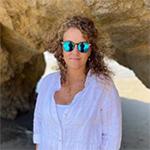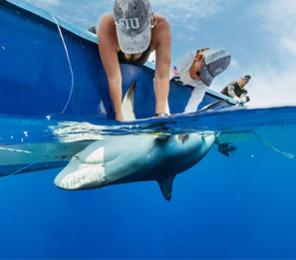
Jessica R. Quinlan, Ph.D.
Originally from Long Island, NY, Dr. Quinlan received her B.S. in Marine Sciences from Stony Brook University and her Ph.D. from Florida International University under the mentorship of Dr. Chapman. Her research explores new ways to obtain relevant information for shark fisheries management using catch, trade, and population data. She developed the Anal Fin Monitoring Program (AFMP)—a cost-effective way for resource-limited nations to collect important landings information from their shark fisheries, advanced the application of environmental DNA to shark conservation, and co-authored a project that developed a molecular technique to detect protected shark species in international trade. She is currently working on using the data collected through the AFMP to improve sustainability assessments for Belize shark fisheries and identifying the region of origin for one of the top traded fins in the Asian shark fin trade.
Jessica has been collaborating with fisherfolk since 2018 as part of her dissertation work and quickly realized along with her passion for conservation, she was equally as zealous to work with fisherfolk and create opportunities for collaboration with them in research. She moved to Belize during her final year of graduate school, where she founded an NGO, Fishers4Science (F4S), with a mission to advance fisherfolk involvement in scientific research, science livelihoods, science communication, and science-based management of marine resources. Her hope is for F4S to be a platform to further facilitate working relationships with fishers, create more opportunities for fisherfolk in research, and continue to collaboratively conduct effective research working towards the goal of maintaining sustainable shark fisheries in Belize and contributing to our overall knowledge of sharks in the Mesoamerican region.
Why are you interested in your research focus?
The management and sustainable use of our marine resources is our collective responsibility, I think it is important to support research in areas that may have resource limitations impeding their ability to collect necessary data to sustainably manage their fisheries. Working with local government and fishers- the primary stakeholder of the fishery- creates a pathway for knowledge exchange and a unique relationship that enhances our collective ability to monitor and understand the shark fishery in a way that each could not achieve on their own. I very much love the science behind shark fisheries management and my molecular work, but it is working with people, building capacity, infusing fishers’ knowledge into the scientific world and effecting real, lasting, change together, that is my driving force. Science needs to be collaborative and inclusive—from the individual level all the way up to the international level.
What is one of your favorite moments in the field?
One of my favorite moments in the field actually has nothing to do with sharks! It was coming to Riversdale Village for the first time in graduate school and establishing the working relationships that have laid the foundation to do the work I am so fortunate to continue doing today. That one field trip in grad school changed the course of my life!
Education
- Ph.D. in Biological Sciences, Florida International University, Florida (U.S.)
- B.S. in Marine Sciences, Stony Brook University, New York (U.S.)
- A.A in Liberal Arts, Suffolk County Community College, New York (U.S)
